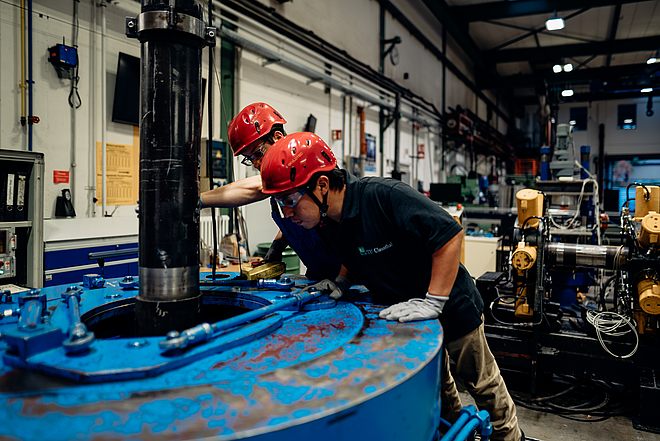
The summer semester 2022 will be the last opportunity to enrol on this degree course.
The course will be replaced by the two new Bachelor's degree courses "Sustainable Resource Extraction and Recycling" and "Geo-Energy Systems".
In the area of conflict between energy transition and structural change, globalization and import dependency, the supply of energy and raw materials is one of the major challenges of the coming decades - not only for Germany, but also for Europe and ultimately the whole world. To solve these complex problems, students on the Bachelor's degree course in Energy and Raw Materials are given a broad, practical knowledge base in natural sciences, engineering and economics. With these fundamental skills, graduates will be able to work on a wide range of tasks in industry and public authorities as well as in research resulting from the far-reaching changes.
Job profile and labor market
Global energy demand is increasing by several percent every year. The same applies to a large number of metals and other mineral raw materials. In just a few years, this demand can no longer be met using current methods and technologies. In order to conserve and sustainably use the resources of planet Earth, we therefore need to rethink society as a whole and make enormous technical progress in all areas of the provision and use of energy and raw materials. As a high-tech country, Germany plays a leading role in the introduction and implementation of the necessary measures. As a result, the demand for well-trained specialists is high for the large number of corporations, companies and service providers as well as authorities and research institutions in the energy and raw materials sector and the range of applications is very diverse.
- Construction raw materials and mining industry
- Processing and recycling industry
- Energy production and distribution companies
- Drilling companies
- Natural gas and oil companies
- Natural gas supply and storage companies
- Planning and engineering offices
- Municipal water and energy suppliers
- Authorities and universities
What makes the degree program in Clausthal special
Clausthal University of Technology has a long tradition in raw materials, energy and materials science and, thanks to this special expertise, offers excellent conditions for imparting the latest scientific and technical knowledge for professional practice and further research. The Bachelor's degree course in Energy and Raw Materials makes use of the broad range of courses offered at Clausthal University of Technology and, thanks to its high practical relevance, offers a first academic degree that qualifies students for a career as well as a sound basis for continuing their university education in a Master's degree course, e.g. Mining Engineering, Petroleum Engineering, Environmental and Process Engineering, Energy Systems Engineering.
Structure of the study program
The Bachelor's degree program in Energy and Raw Materials is divided into two fields of study:
- Energy and Raw Materials Supply Engineering
- Petroleum Engineering
Both fields of study have a large number of identical basic modules in natural sciences and engineering, business administration and law, as well as specialized modules based on these. In addition to the compulsory modules, a range of elective options are offered for in-depth study or specialization.
Energy and raw materials supply engineering
- Natural and Geosciences
- Extraction technology in open-cast and underground mining
- Processing technology
- Surveying
- Soil and rock mechanics
- Occupational safety and health protection
- Mining and environmental law
- Business administration
- Data processing and computer science
Petroleum Engineering
- Natural and Geosciences
- Deep Drilling Technology
- Petroleum / Natural Gas Reservoir Engineering
- Crude oil / natural gas extraction
- Petroleum / Natural Gas Production Engineering
- Geothermal energy
- Occupational safety and health protection
- Mining and environmental law
- Business administration
- Data processing and information technology
Industrial internship
A total of 8 weeks of work placement must be completed. A 4-week basic internship must be completed before starting the degree course. Upon request, it is possible to complete the basic internship by the beginning of the 3rd semester. The 4-week specialist internship can be completed during the semester break.
Field of study Energy and Raw Materials Supply Engineering
Prof. Dr.-Ing. Hossein Tudeshki
Phone: +49 5323 72-2225
Fax: +49 5323 72-2371
E-mail: ba.ervt@tu-clausthal.de
Institute of Mining
Erzstraße 20
38678 Clausthal-Zellerfeld
Field of study Petroleum Engineering
Bettina Jenei
Phone: +49 5323 72-2068
Fax: +49 5323 72-3146
E-mail: bettina.jenei@tu-clausthal.de
Institute of Subsurface Energy Systems
Agricolastraße 10
38678 Clausthal-Zellerfeld
Overview
Type: Bachelor's degree programme
Duration: 6 semesters
Language of instruction: German and English
Degree: Bachelor of Science (B.Sc.)
Admission requirement: Higher education entrance qualification
Start of Studies: Last opportunity to apply and enroll for the summer semester 2022!!
Accreditation: ASIIN Certificate
accredited for the phase-out until 30.09.2027
FAQ
Answers to frequently asked questions on the website of the Institute of Subsurface Energy Systems.
These degree programmes may also interest you
Subsequent Master's Degree Programs
Mining Engineering
Petroleum Engineering
Energy Systems Engineering
Environmental Process Engineering and Recycling
Documents
Exam Regulations
- General Exam Regulations German
- General Exam Regulations English
- Executive Regulations for WS 15/16 to WS 26/27 German
- Executive Regulations - WS 15/16 until WS 26/27 English
Internship Regulations
Elective Catalogs
Model Study Plans
- Model Study Plan SR Energy and Raw Material Supply Technology
- Model Study Plan SR Petroleum Engineering
Module Handbooks
Technician to Bachelor Program
